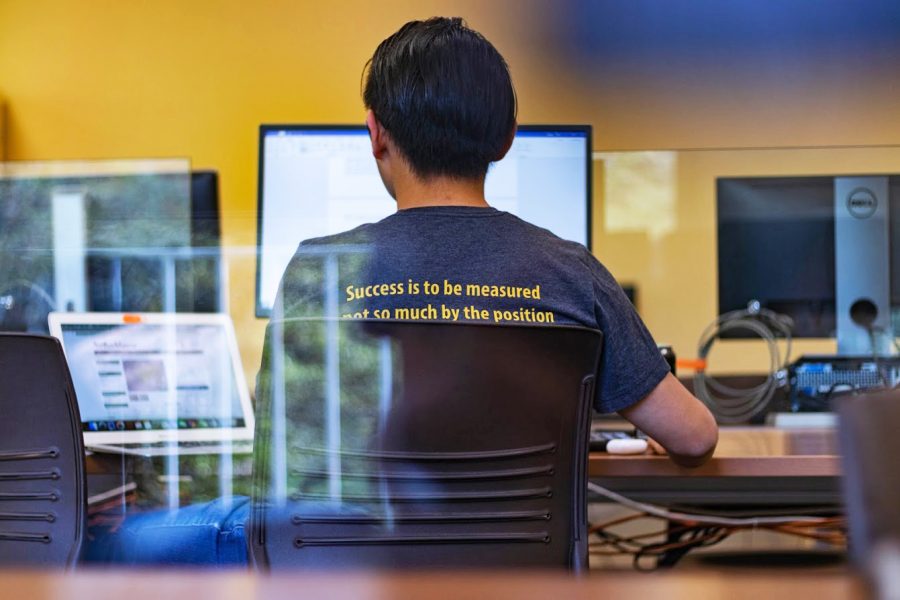Opinion | End Zoom’s tyranny toward education
A student works on a computer at the PAR computer lab on April 28, 2020. Columnist Matthew Krauter argues that it’s time that Zoom exits our lives to make way for in-person classes in the fall.
May 7, 2021
As an unusual semester of socially distanced classes comes to a close, many students waved goodbye to their cameras one last time as professors ended their class Zoom meetings. Likewise, as the student body becomes increasingly vaccinated, it’s time for the Zoom era to end at the University of Illinois.
When COVID-19 struck the country in March of 2020, it hit hard. The end of the semester was uncertain for the students returning from spring break: Zoom was the solution, connecting students and professors around the world in a turbulent transition from the classroom to the desktop.
The University’s saliva tests aren’t the only reason the academic year has continued relatively smoothly. Zoom, accordingly, deserves credit where it’s due for its ease of access and abolition of the iClicker resale market.
As I unloaded my bags for a grumpy team of Transportation Security Administration agents in California, I had to pinch myself upon spotting the Zoom branding advertised on the inspection bins — I reject the idea that shaking hands is a relic of a bygone era.
Zoom shouldn’t be here to stay for classes. It was always meant to be a band-aid for COVID-19, not the vaccine.
Get The Daily Illini in your inbox!
“Zoom University” is not a substitute for a college lecture. Rolling out of bed one minute before the call begins is quite different from trekking across the Main Quad to Foellinger Auditorium. To no fault of the students or instructors, virtual classes are demoralizing, awkward and difficult to focus upon.
Anyone who has led a virtual meeting this past year can attest to the challenge of engaging an audience of faceless participants with their cameras off: The black mirror holding your reflection is worse than speaking to a wall because it’s a living one.
A wall that no matter how hard you try to talk to will writhe with all its might to avoid participation. Professors may ask for cameras to be turned on, but the quality of attentiveness and participation is always subpar to standard classes.
Being the participant presents its own set of challenges. It’s not easy staying engaged amidst the monotony of sitting in your room all day. The temptation to play chess in another tab or text a friend rivals Eve in the garden.
There’s a lack of human connection over the call that icebreakers don’t surmount. It’s a bit awkward to unmute yourself to speak in a discussion, and subsequently be notified your connection is unstable and nobody can hear you.
The difficulty of online learning only compounds in asynchronous lectures as you set the playback speed to 2x to speedrun it for more Netflix time.
Beyond purely academic engagement, RSOs and campus social life suffer from virtual meetings. RSO attendance has declined sharply due to the social obstacles presented by Zoom and the lack of engaging in-person events.
At root, young adults crave face-to-face social interaction. Unlike adults in the workforce savoring their days working from home, college students want to continue growing into the people they want to be despite the challenges of COVID-19. They want to network, work in new places — reap the tangible rewards of their hard work on campus.
The Zoom era must meet its end because COVID-19 cannot be our new normal. It’s in the interest of student social life and academic success to revert to normalcy as the University community continues to press back the threat of COVID-19.
Matthew is a junior in LAS.







